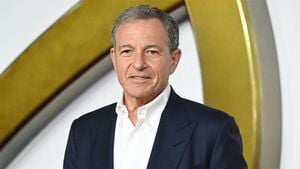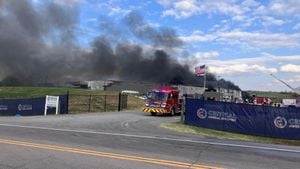Economic upheaval has become the new norm for Russia as the impact of its continued war against Ukraine digs deep. Russian citizens are feeling the pinch particularly hard, with recent reports showing shocking price hikes on basic staples like potatoes, which have surged by 64%. This increase has been attributed to multiple factors including poor weather conditions, rising production costs, wage increases, and significant labor shortages arising from the conflict.
According to Rosstat, Russia's federal statistical agency, food prices across the board are climbing. For example, butter prices have soared by 27.5% this year, leading to reports of desperate measures, including individuals stealing food items. Such price escalations come as no surprise as the country grapples with soaring inflation driven by Vladimir Putin's military endeavors.
September saw seasonally adjusted inflation shoot up to 9.8%, marking significant growth from 7.5% just the month before. The Central Bank of Russia, attempting to curb these rampant price hikes, raised its key interest rate to an astonishing 21%—the highest the country has ever seen.
The repercussions of these fiscal decisions are far-reaching. Analysts warn of grave consequences for Russian firms, many of which are at risk of defaulting on loans due to the sky-high interest rates. Oleg Kuzmin, from Renaissance Capital, points out the precarious situation for highly leveraged companies, which often rely on new loans to pay off old ones. With borrowing becoming increasingly expensive, bankruptcies among corporations rose by over 20% in just the initial nine months of this year.
The ramifications of these changes are also likely to strike the defense industry hard, potentially impacting its ability to maintain operations as funding becomes scarcer. The pressures are intensifying, and for the first time since the outbreak of the Ukraine conflict, voices within Russia's business community are openly criticizing the central bank's policies. Business leaders who have largely kept silent until now are beginning to vocalize their concerns, particularly with respect to Central Bank Governor Elvira Nabiullina, who has held her post since 2013.
While Russia’s leadership continues to espouse the narrative of resilience against the crippling impact of Western sanctions, the reality is becoming harder to ignore. A recent report titled 'The Dictator's Reliable Rear,' authored by experts such as Sergey Aleksashenko, Vladislav Inozemtsev, and Dmitry Nekrasov, analyzes the Russian government's claims and unpacks the true economic situation resulting from the sanctions.
For starters, the report addresses the myth surrounding Russian oil and its ability to be replaced on the world market. Analysts suggest Russia’s share is substantial enough to make it nearly impossible for the West to completely cut the country off without throwing the global economy itself out of balance. India and China, noted targets of the sanctions, continue to purchase substantial amounts of oil and gas from Russia, effectively counteracting Western efforts to isolate Moscow economically.
The budget funds for the military conflict are another area of concern. The report details how portions of GDP earmarked for defense spending are less than many nations have invested during past global conflicts. Yet, even amid growing budget deficits, Russia finds itself capable of sustaining military operations longer than anticipated.
Romania’s economic policy has also come under scrutiny as inflation and labor shortages pile additional strain on its already fragile economy. While Russia's long-dormant economic-policy debate heats up, the images of socioeconomic stability are not all there. We now see wealthy persons, the oligarchs, beginning to voice opposition to the governing bodies, marking an extraordinary shift. Names like Oleg Deripaska and Alexey Mordashov have publicly expressed dissatisfaction with rising interest rates aimed at combating inflation.
What’s alarming is Chemezov, CEO of state-owned Rostec, who recently critiques increasing interest rates during discussions with the Federation Council. He argues these financial policies threaten to bankrupt more enterprises across the nation, especially within the military sector which is positioned to dominate the budget with 32.4% slated for national defense spending.
The reality of the 2025-2027 budget proposal hints at prolonged military engagement as well; approaching levels last seen during the late Soviet Union. While the Kremlin projects moderate growth, analysts stress these forecasts seem improbably optimistic considering current conditions.
Unfortunately, the government's insistence on military supremacy hints at possible future calamity as rising debts, mainly borne from increased social burdens and lacking revenues, may lead to dire consequences for the average Russian. The population is likely going to be the unwilling subject of this war budget, shifting the burden largely onto taxpayers, as visible signs of economic fragility loom.
The very foundation of the Russian economy remains shaky, tied closely to energy prices. While the government maintains it can sustain military operations, heavy reliance on the sale of oil to fund war efforts can only last for so long. The high demands of military readiness might soon collide with the limitations of civilian economic capacities.
Yet, government portrayals of stability persist, which are being increasingly questioned as the war drags on and external conditions worsen. The precarious balance between military spending and civilian economic health creates tremendous uncertainty. Could the economic strains eventually stir unrest among the populace?
All of these factors culminate to hint at one undeniable truth: Russia's economic narrative is shifting. Indeed, the once-opaque dealings of Putin’s inner circle are now being probed, not just by international interests but also from within the country. The debate about economic reform, financial stability, and the true impact of sanctions may glow ever-stronger as ordinary Russians continue to face rising prices and diminished purchasing power.
It's been nearly three years since Russia embarked on its military incursion, and as the country navigates these stormy economic waters, the fundamental question remains: How sustainable is Russia's approach to warfare?



